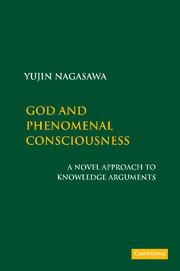Book contents
1 - The Structure of Knowledge Arguments
Published online by Cambridge University Press: 23 July 2009
Summary
INTRODUCTION
Knowledge arguments attempt to transform, via arcane alchemical processes, the base metal of epistemological premisses into the gold of ontological conclusions. From what one knows and does not know, they attempt to derive what there is and is not in this world.
In this work I purport to reveal a hitherto unnoticed connection between the debates on the mystery of phenomenal consciousness, on the one hand, and the existence of God, on the other, by discussing four knowledge arguments in two distinct areas of philosophy: Frank Jackson's Mary argument and Thomas Nagel's bat arguments in the philosophy of mind; and the argument from concept possession and Patrick Grim's argument from knowledge de se in the philosophy of religion. I compare and refute these arguments and derive from their failure a novel metaphysical thesis, which I call ‘nontheoretical physicalism’. However, before attempting to achieve this goal, it is important to understand the relevant conceptual background so that we can appreciate the full force of the knowledge arguments.
JACKSON'S MARY ARGUMENT
The term ‘knowledge argument’ is most commonly used to denote Frank Jackson's influential argument in the philosophy of mind (Jackson 1982, 1986). In this work I call his knowledge argument the ‘Mary argument’ because, as we will see below, it appeals to a scenario about an imaginary scientist called Mary. The aim of the Mary argument is to show that physicalism is false. Physicalism is the ontological doctrine that, in the relevant sense, everything is ultimately physical.
- Type
- Chapter
- Information
- God and Phenomenal ConsciousnessA Novel Approach to Knowledge Arguments, pp. 3 - 14Publisher: Cambridge University PressPrint publication year: 2008



